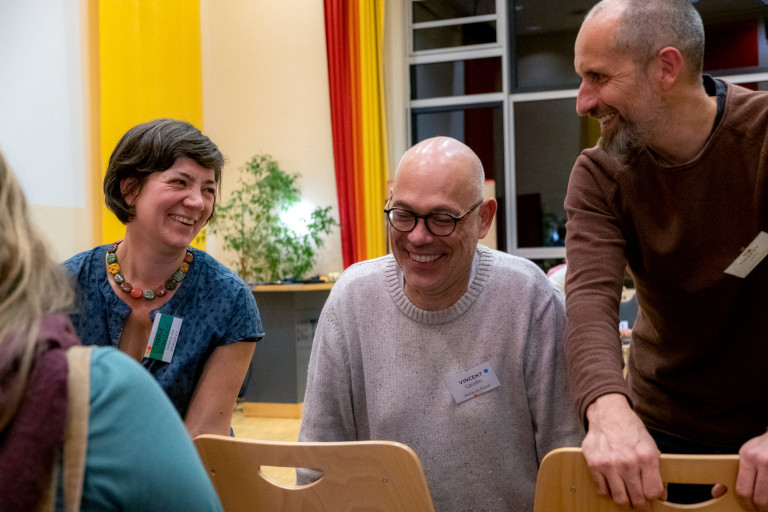In early November, the Rural Resilience project was proud to support the European Action-Gathering for Sustainable Food Systems. This meeting of over 100 food systems actors working at local, regional, national and European levels was co-organised by ARC2020 and local partners Kollektiv von Morgen and AbL in Marburg, Germany. Report by Louise Kelleher of the Rural Resilience project.
“Like one big family.” That’s how one French participant described the European Action-Gathering for Sustainable Food Systems in Germany.
A family of action-takers: farmers and food systems workers, elected officials, administrations, researchers and educators, and members of civil society organisations – some friends, many strangers – who came together to call for an integrated policy shift for sustainable farming practices and a resilient food system.
Co-organised by ARC2020 at European level, with AbL (Arbeitsgemeinschaft Bäuerliche Landwirtschaft e.V., German member of La Via Campesina) at national and regional level, and Kollektiv von Morgen, working on the ground in Marburg, the gathering was a resilient response to the European Commission’s failure to deliver on the promised proposal on a Sustainable Food Systems law – even as Germany and France are working on their own National Food Strategies.
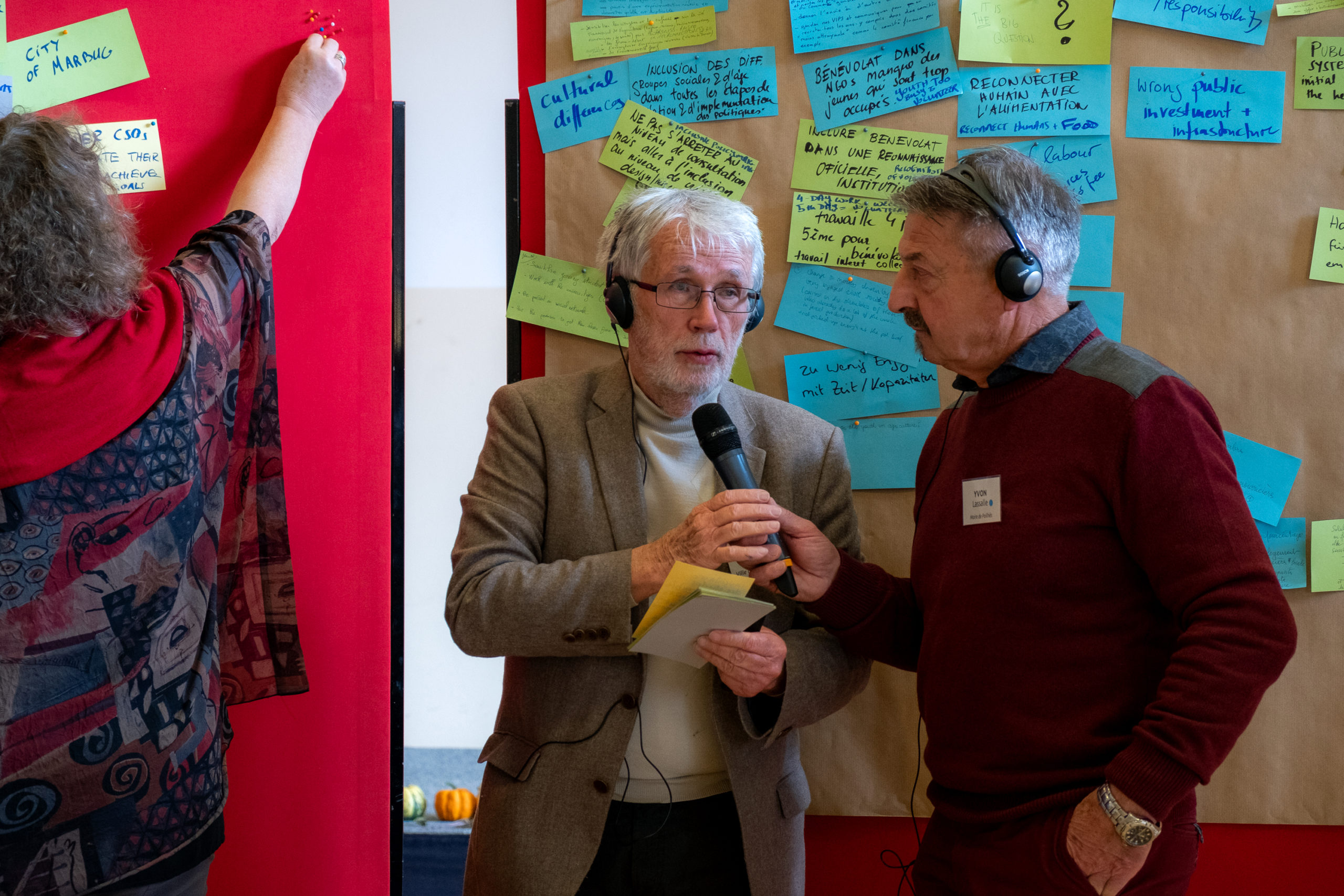
Building bridges in three languages: (l-r) Daniel Le Blay, local councillor for Mouans-Sartoux, and Yvon Lassalle, Mayor of Pailhès, contribute to the trilingual workroom on governance. Photo: Adèle Violette
For the Rural Resilience project, the gathering was an opportunity to draw together the strands of resilience that have emerged from our research on the ground in France. This year, the project’s focus has extended to Germany. It’s been especially insightful to compare experiences between the two countries on key topics such as democratising food policy, access to land, and water as a common good.
Participants who made the long journey from France brought to Marburg their energy and experience, their ideas and initiatives. In a spirit of co-creation, inspired by field trips that immersed us in the terrain and inputs that whisked us away to territories near and far, we put our heads and hearts together to exchange, to reflect, to break bread together, and to identify challenges, actions and solutions.
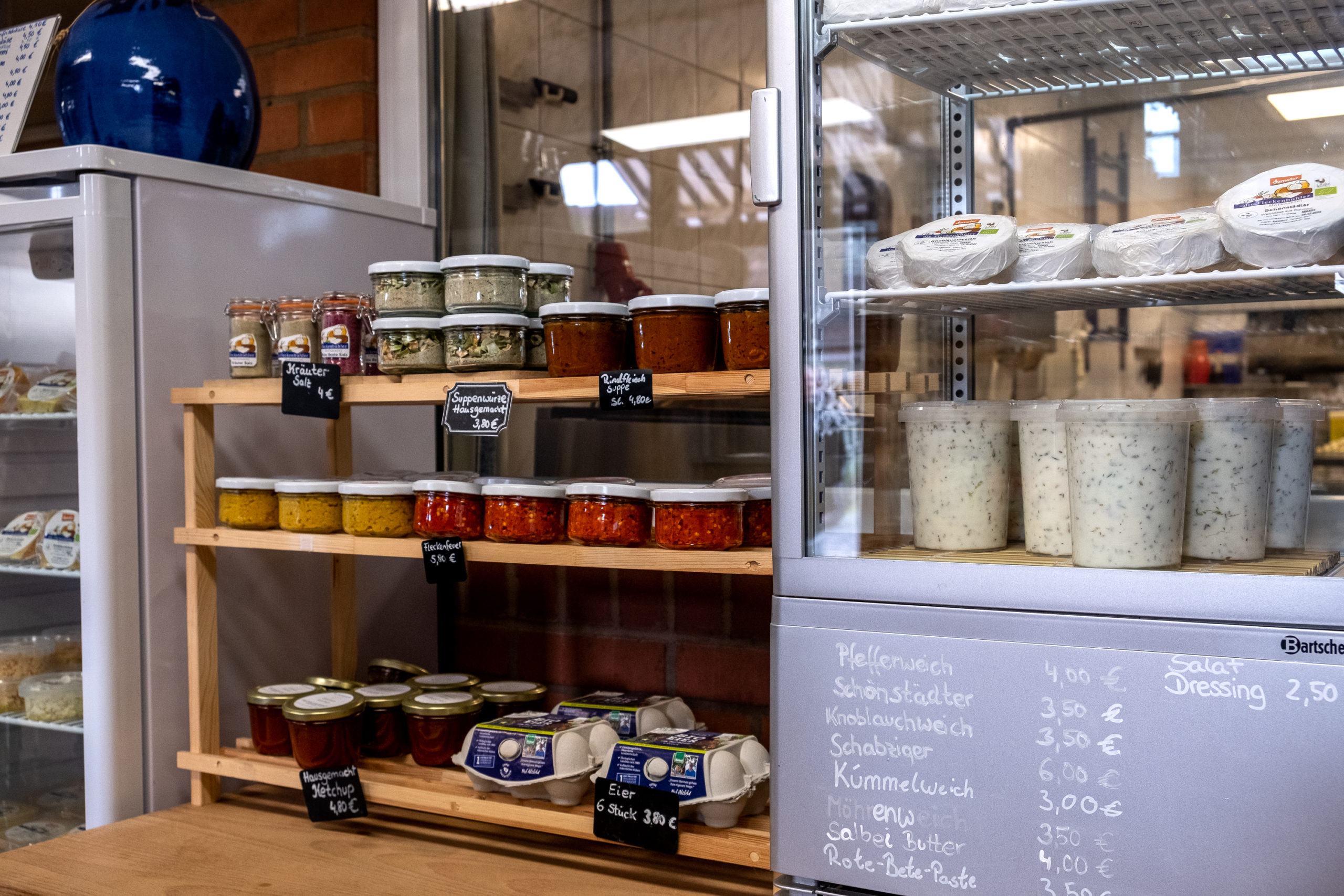
Field visit to Fleckenbühl farm, a self-help facility for people with addiction problems, which sells its local, organic produce in the farm shop. Photo: Adèle Violette
Local councillors Vincent Gaudin, Anthony Cabas and Thierry Lohr from the municipality of Plessé in the West of France shared learnings from their local agricultural and food policy (PAAC), which encourages citizens to take the helm using the tools of participative democracy. With the goal of a ‘livable village for all’, not only has Plessé bucked the trend of disappearing farms; the number of farms in the municipality is on the rise.
Like Plessé, the small town of Mouans-Sartoux in the South of France has tapped into the potential of school canteens as a lever for change. Local councillor Daniel Le Blay described the domino effect of the municipality’s flagship action: in 2012, three school canteens made the switch to 100% organic produce. One thousand children now eat a locally produced farm-to-fork lunch every day. Importantly, the benefits are effectively communicated to their families. Thanks to this surge in conscious eaters, by 2022, the town had reduced its food-related climate footprint by 20%.
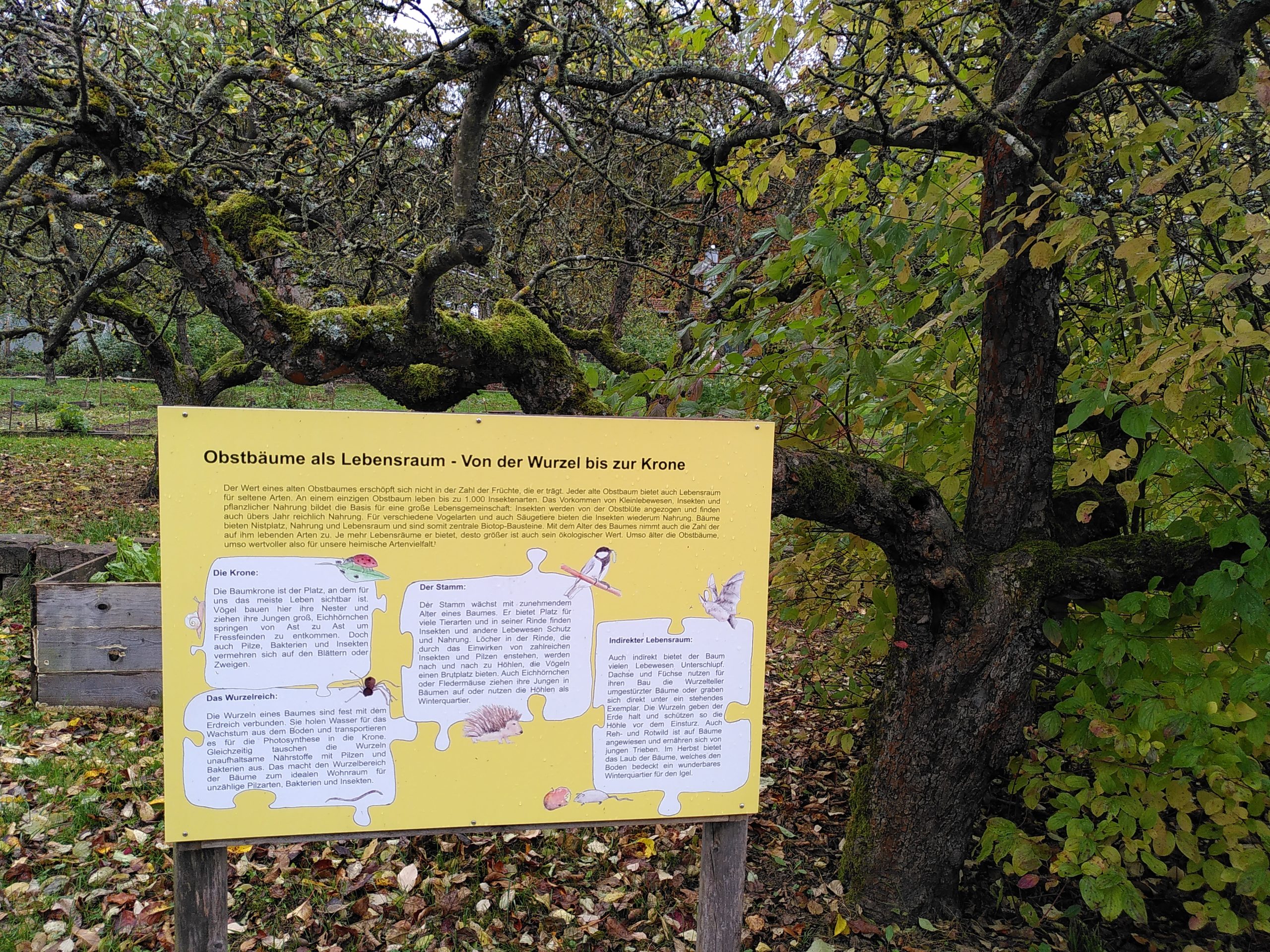
Joining the dots between biodiversity, food and community: Educational panel at the Gesundheitsgarten (‘health garden’) in Marburg. Photo: Louise Kelleher
Indeed, raising awareness of the true cost of food on health, the environment and society was a lively topic of discussion in Marburg. Bringing experiences of another local authority in the South of France were Yvon Lassalle, Mayor of the village of Pailhès, and his colleague Sébastien Blazy who works on the Ariège Territorial Food Programme (Projet alimentaire territorial – PAT), a cooperation between 237 rural municipalities that is elaborating a local food strategy with the help of a Local Food Council. They will take back learnings from Marburg to their projects and committees in Ariège.
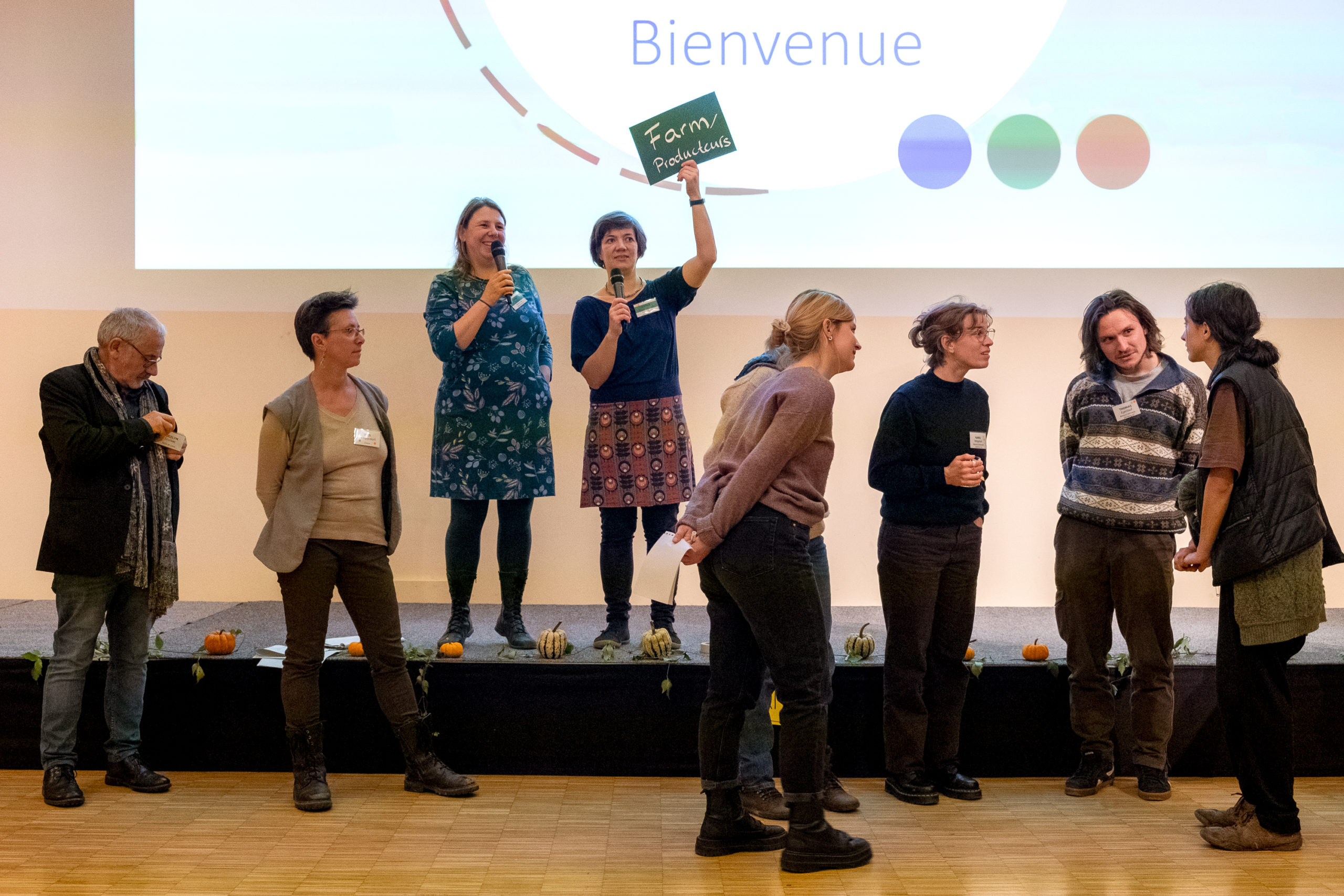
Icebreaker: (l-r) French farmers Jocelyn Ecolivet and Inès de Rancourt in the “producers’ corner” with some of the German farmers who participated in the gathering. Photo: Adèle Violette
Of course any local food strategy begins with access to land for food production. Jocelyn Ecolivet, a dairy farmer representing Terre de Liens Normandy, explained the work of that organisation to preserve agricultural land and support the installation of new entrants. It made for an interesting comparison with the approach of AbL Mitteldeutschland, which is campaigning for common good leasing and regulation of the land market. During field visits to farms in the Marburg region, we saw alternative models of financing in practice. Based on these and other inputs, the workroom on access to land and commons recommended setting up associations akin to Terre de Liens in Germany to make communal forms of ownership more well known.
Strong cooperation between actors is another essential ingredient for change. Food system connectors are the missing link, and this role should be co-financed by municipalities, proposed a workroom on committed partnerships. Inès de Rancourt, a goat farmer in the Biovallée de la Drôme and board member of the CIVAM network, brought to this discussion her experiences with women’s groups that are empowering women farmers to stand up and be counted for their role in changing our food systems.
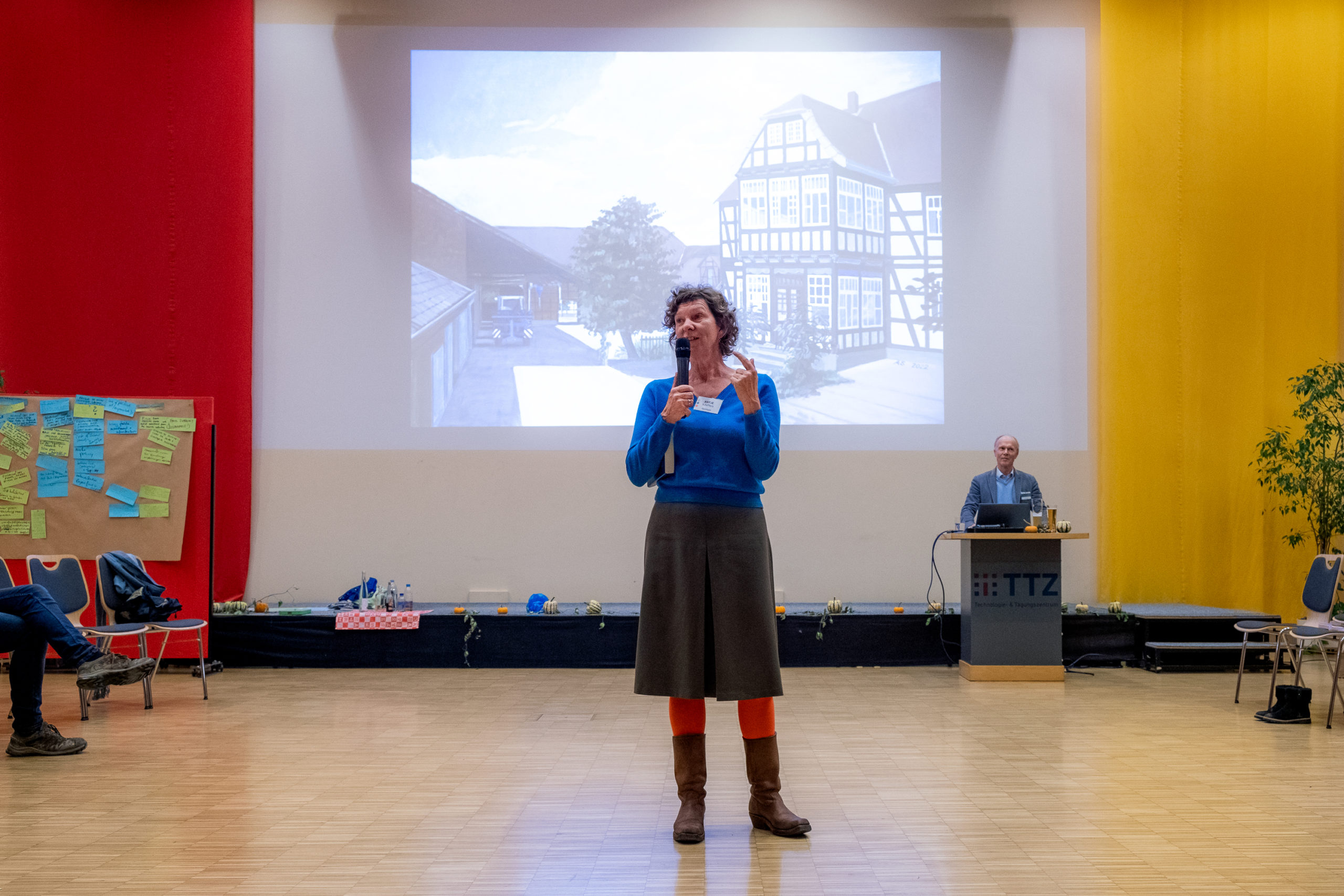
Long Night of Farmers films: Artist Antje Schiffers (MyVillages) grounded us in the joys and frustrations of food production with a screening of short films made by farmers about life on their farms. Photo: Adèle Violette
Rural women are often forces for change, as are rural young people. Experimenters – and their experiments – must be supported by policy. Inclusion of marginalised voices in civil society goes hand in hand with ensuring support and recognition for volunteers.
A four-day work week was proposed as a concrete action to allow time for volunteering, echoing the proposal made in 2019 in the very same room in the context of the declaration of a climate emergency in Marburg. In German, Freitag (Friday) literally means “free day”. Imagine what civil society could accomplish were citizens able to choose to dedicate one day a week to transforming our food systems!
French and German participants found common ground in a two-pronged strategy for change:
- just do! – live different examples of change and multiply successful actions, but at the same time…
- demand change through political engagement.
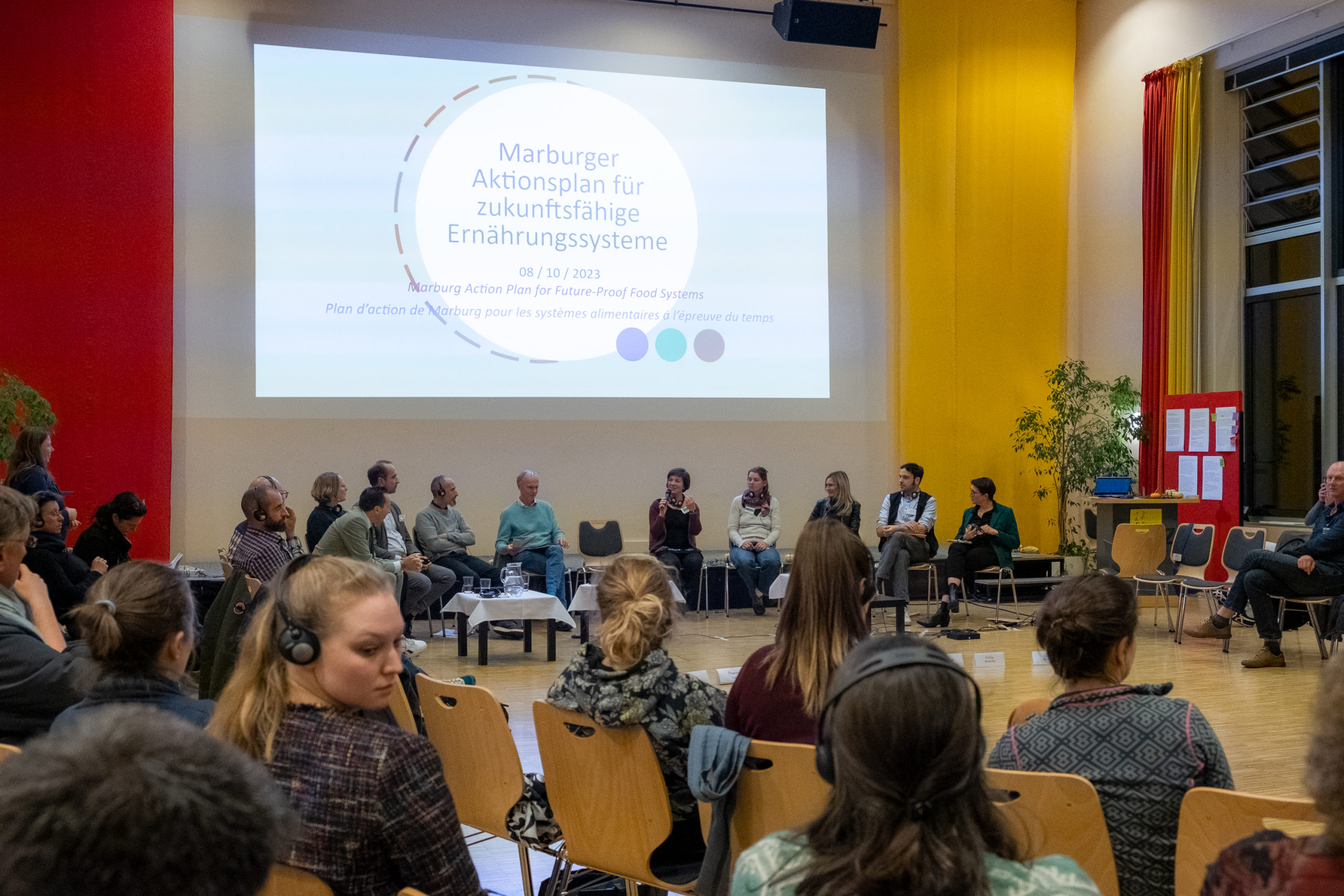
“Food for Action” inclusive panel debate: (l-r) Oliver Conz, State Secretary of the Hesse Ministry for the Environment, Climate Protection, Agriculture and Consumer Protection; Saskia Richartz, Network of Food Policy Councils in Germany; Tim Treis, Hessen Organic Farming Association (VÖL Hessen e. V.); Thierry Lohr, Municipality of Plessé; moderators Hannes Lorenzen (ARC2020) and Merle Drusenbaum (Kollektiv von Morgen); Claudia Smolka, AbL Hessen; Nadine Bernshausen, Mayor of the City of Marburg; Phillip Brändle, German Platform of NGOs on Farming, Food, Environment, and Animal Welfare; Silvia Bender, German State Secretary of the Federal Ministry for Food and Agriculture. The empty chair in the middle is for the European Commission (DG AGRI and SANTE), which declined the invitation to participate. Photo: Adèle Violette
On the political level, the Rural Resilience project looks at multi-tiered rural policies, from the local to the European. The gathering closed with a panel debate that invited speakers from the local, regional and national level in Germany, including Thierry Lohr for the municipality of Plessé. Since the European Commission’s Directorates-General AGRI and SANTE declined the invitation to take part, the European level was represented by an empty chair.
Panellists were presented with the initial iteration of the Marburg Action Plan for Future-Proof Food Systems, a co-creation by all of the participants from these three days together, which is currently being prepared for publication. Importantly, the Action Plan is shaped by these actors and their diversity of backgrounds and experiences, at the local, regional, national and European levels.
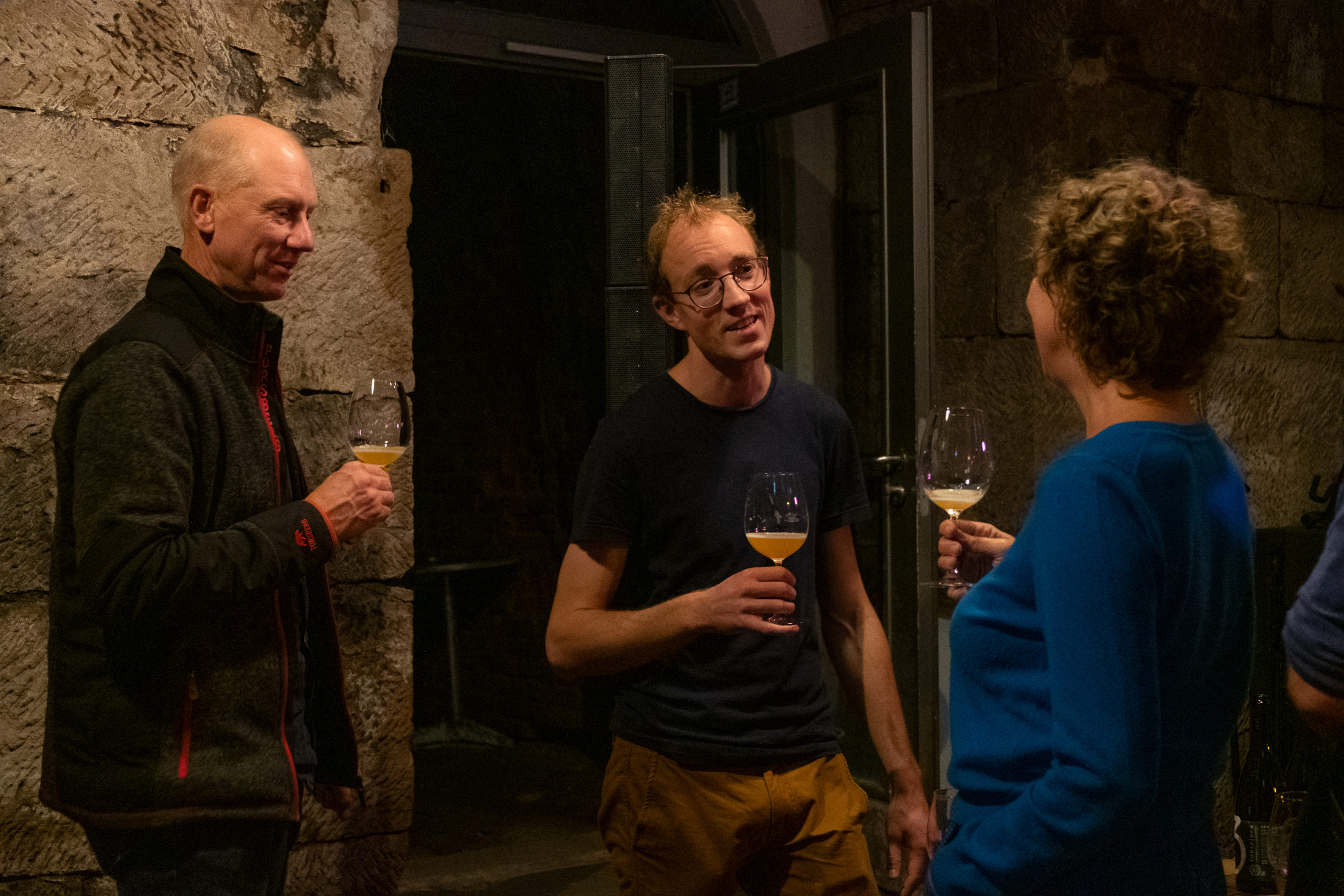
Raising a glass to crop diversity and fairer supply chains: (l-r) Farmer and journalist Marcus Nürnberger (Unabhängige Bauernstimme), brewer Lucas van den Abeele (3 Fonteinen brewery) and artist Antje Schiffers (MyVillages) enjoy a traditionally brewed Belgian beer made with local grains. Photo: Adèle Violette
An Action Plan is only as strong as the collective commitment of its actors. This gathering was a very human moment of weaving connections between sectors, territories and generations. Not waiting for the EU to join the dots on an integrated food, farming and rural policy, these action-takers from a diversity of fields are committing to continued cooperation for fairer and more resilient food systems.
System change begins with trust and respectful relationships. These three days in Marburg were a reminder that only by building bridges – human to human, from the local to the European, across social and geographical divides – can we find the solidarity, empathy and hope that is needed to fuel this change.
The European Action-Gathering for Sustainable Food Systems was organised in collaboration with Ernährungsrat Marburg und Umgebung e.V. (Local Food Council Marburg) and the Municipality of Plessé, and with the generous support of Porticus, the Municipality of Marburg, the District Marburg-Biedenkopf, the Robert Bosch Foundation, Sparkasse Marburg-Biedenkopf, Fondation de France and Fondation pour le Progrès de l’Homme.
In 2023-2024, the Rural Resilience project embarks on a new phase of joining the policy dots while continuing to nurture what we have built together, and widening the lens from France to Germany and the broader Europe. To learn more, visit the project page, and follow ARC2020 on LinkedIn, Twitter, Facebook or Instagram.
Return to the Rural Resilience project page


